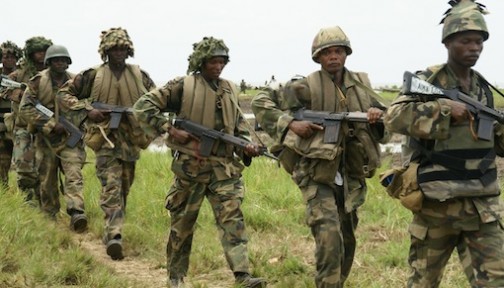The Nigeria army on Wednesday said it would send troops into the country’s volatile central states to quell violence between farmers and herders that has taken over hundred lives in recent weeks.
According to Major General David Ahmadu, the deployment set for February 15 would crack down on “herdsmen/farmers clashes and attacks on innocent members of our communities, particularly in Benue, Taraba and Nasarawa state by armed militias”.
The operation will also target “armed banditry, kidnapping and cattle rustling” in Kaduna and Niger, plus other crimes in Kogi, he added.
Ahmadu, who is the army’s head of training and operations, said criminal activities had “continued unabatedly in these states despite the efforts by sister security agencies to curb them”.
There was no immediate indication of the number of troops involved.
But Ahmadu said operations would include “raids, cordon and search operations, anti-kidnapping drills, road blocks, check points and show of force as well as humanitarian activities”.
Amnesty International said last week that 168 people have been killed in communal violence between herders and farmers this year alone, with about 100 in Benue state.
The global watchdog warned the violence was “spiralling” out of control.
The International Crisis Group warned in a report published last September said some 2,500 people were killed on both sides in 2016.
It warned the conflict was becoming “as potentially dangerous as the Boko Haram insurgency in the northeast”.
Political opponents of President Muhammadu Buhari have seized on the issue because of his perceived inaction towards the violence — and his own ethnicity.
Like the herders, Buhari is an ethnic Fulani from the mainly Muslim north, while the farming communities are in the largely Christian south.
The police have also been accused of not doing enough to end the violence, which has seen tit-for-tat attacks between farmers and herders.
Thousands of people have been killed in recent decades in a dispute, mainly over land and grazing rights.
But the violence has become increasingly politicised and exacerbated by religious and ethnic rivalries.
Desertification has pushed the cattle drivers further south in search of land and water for their livestock, leading to accusations from farmers that herds have ruined their fields.
Cattle rustling and kidnapping for ransom have become a problem in state such as Kaduna and Niger as a result of Nigeria’s wider economic troubles, that have forced some into criminality.














